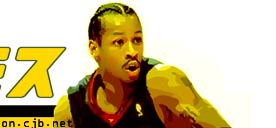





| The Question is Answered |
|---|
|
IMAGE MAY NOT BE EVERYTHING, BUT PERCEPTION CERTAINLY CAN BE |
|
As far as Philadelphia superstar guard Allen Iverson is concerned, it's a shame that it took a First Team All-NBA selection, winning the league's scoring title and leading the 76ers to the playoffs for the first time since 1991 for him to take his place among the league's elite in both talent and perception.
"It was unfair," said Iverson, who is in his fourth NBA season as one of the league's established young superstars. "I've been saying that from the beginning. I think it's always been unfair the way people treated me when I first came into the league because of my past. I know I had some baggage when I first came into the league and people took some shots at me right away. "Then it took winning for people to just try to accept me, try to understand me, listen to what I had to say instead of just judging me by what they heard on television or read in the newspaper. It took winning for people to start to open their eyes and look at me. But that's life, and I accept that." On the surface, Iverson, who left Georgetown after only two seasons and became the first overall pick in the 1996 draft, has changed little. The cornrows, tattoos, hip-hop clothes, flashy jewelry, expensive cars and controversial friends are still there, but the surface doesn't tell the whole Iverson saga anymore. The Sixers' first playoff appearance in eight years was Iverson's first mass exposure to NBA fans in an unfiltered forum. Instead of the selfish, disrespectful, egotistical basketball thug Iverson had often been presented as, fans across the country got a firsthand look at the hardworking, highly competitive, captivating, dynamic, engaging young star that Sixer fans had grown to love. Seemingly, almost overnight, Iverson went from being the poster child for the NBA's DeGeneration X to a player that NBA Commissioner David Stern praised for his performance during the 1998-99 season. Suddenly, Iverson, who had complained bitterly about not getting the recognition he deserved, is now gracing the cover of the 1999-2000 NBA Register, one of the two main reference books published by The Sporting News and the league each season - joining Julius Erving and Moses Malone as the only Sixers to do so. "Really, I didn't even know that," said Iverson about the cover. "I hate to say this, but winning changes things. I'm still mostly the same person. People are just starting to accept me now. I think the media portrayed me unfairly from Day 1 and blew a lot of things out of proportion. Now people are starting to see another side of me, that I have a family that I care about, including two children that I'm at home taking care of." Whether the negatives about Iverson were exaggerated or not, even The Answer would have a hard time denying that he has matured greatly since entering the league as a brash, cocky 21-year-old who wasn't able to escape the negative scrutiny from his 1993 conviction and incarceration. Iverson had allegedly been involved in a bowling alley brawl in his hometown of Hampton, Va., when he was only 17. But the conviction was later overturned. His first season was low-lighted by an alleged in-game disrespecting of the legendary Michael Jordan. The 1997-98 season brought the arrest of some of his controversial friends on drug charges while driving Iverson's car. And last year, there was Iverson's much-publicized in-game blow up with Philadelphia coach Larry Brown that got him benched for the second half of a game against Cleveland. Iverson suspiciously did not travel with the Sixers to Toronto for their next game, citing a hamstring injury. But last season also brought changes in Iverson. Noticeably absent from the Sixers' scene were the members of Iverson's so-called "posse." While always remaining loyal to the friends he grew up with in the projects of Hampton, The Answer had talked to them about how if they got in trouble it was invariably going to come back on him. Iverson's mother, Ann, also started traveling on road games with her son to act as a "grounding force." "My friends and I have been through a lot of things in our lives," Iverson said in his recent interview on HBO's Chris Rock Show. "We've [messed] up just like everybody else. But all of us are getting better. We've been poor for 20 years-plus, and I finally came into some money and I do want to live a little bit. "I know my friends can make things hard for me if they mess up. I've been embarrassed by some of the things that have happened. I don't want them to happen again, and my friends know that. Still, the best thing that I can say about myself is that I've remained true to my inner-city roots." But perhaps the biggest indication of Iverson's continued maturity came a few days after his blow up with Brown when he swallowed some of his immense pride and publicly apologized to Brown and his teammates. Iverson said that he was unequivocally wrong for yelling at his coach and bringing unnecessary distraction to his team while it was battling for a playoff spot. "I think people started to trust me," Iverson said. "I opened up a little bit, and I started to mature in front of them." They started to respect him, too. And respect is something Iverson has fought for his whole life. "Do you know how many people don't make it?" he said. "When I was coming up, they said one out of a billion make it to the NBA, so I respect guys just for being here. I think people should respect me just for being an NBA basketball player, just for being a Philadelphia 76er." It's never quite that simple. But by the time the Sixers had ended their surprising 28-22 season, which featured a first-round playoff upset of the Orlando Magic before they were swept out the Eastern Conference Semifinals by the Indiana Pacers, the brutally honest Brown had not only lauded his third-year guard for his competitiveness, heart and leadership but he also said that Iverson had "come so far in so many places." "If I was his parent, I'd be as proud of him as anybody possibly could be of their son," said Brown. "As a coach, I feel the same way." This summer the silence around Iverson was deafening, and no one in Philadelphia was complaining. No police reports. No screwy stories out of Hampton. The only time Iverson's name was heard was when he held his charity weekend to support the Boys and Girls Club of Greater Hampton Roads and when he teamed up with world champion boxer Roy Jones Jr. to hold an all-star charity basketball game at Temple University to support Philadelphia's summer basketball league. "Allen is maturing, but he's still going to do it his own way," said Sixers President Pat Croce, who signed Iverson to a six-year contract. "What some people do 'post-up,' Allen does 'alley-oop.' And that's OK. I think that's what makes Allen special. But he understands his responsibilities. A lot of people don't realize how smart Allen is about life, both on and off the court. He knows the deal. He's a good person. I don't know what 'it' is, but whatever 'it' is, Allen has it, and I love it." Now it's time for the next stage of evolution for Allen Iverson to begin. Iverson, who averaged 26.8 points last season to edge Los Angeles Laker Shaquille O'Neal for the scoring title, and who at 6-0 replaced Hall of Famer Nate "Tiny" Archibald as the shortest league scoring champion, has on more than one occasion brashly proclaimed himself the next Michael Jordan. "I'm the best guard in the whole league," Iverson said. "I want to be known as the best player in the NBA. I just don't think there is anybody who can stop me. But I'm not about individual accomplishments. It's about winning championships. My goal is not just to win the second round of the playoffs. My goal is to win the whole thing. That's just the way I think regardless of where others say we should finish. I'm thinking championship. I want to be the first one in 2000 to win a championship." With his explosive offensive skills, Iverson can make the Sixers a contender, especially as Philly continues to surround him with other terrific young talents. But for the Sixers to take the next step, it might take some sacrifice on the part of The Answer. Last year, with Eric Snow developing into the Sixers' primary distributor, Iverson flourished as the two guard when he wasn't asked to pass the ball. With that change in the backcourt, Philly produced its first winning season in nearly a decade. But Larry Hughes, the high-flying 20-year-old guard who was drafted eighth overall in 1998 by the Sixers, has to be on the court more often if Philadelphia is to improve from a team that contends for the playoffs to one that could do some damage there. For that to happen, Iverson will have to play the point in order to get Hughes in the game as the off guard. The question is: Will he sacrifice some of his individual game so the Sixers can improve as a team? "Allen has more responsibility as our team's leader," center Matt Geiger said. "Now it's not just about going out there and being one of the best players in the league but being the best player and also making everybody else better. "I think he knows that. That's what all the so-called greatest players were able to do - make other guys better by elevating your game and showing others how to elevate theirs. Allen is a winner now, but there is a higher level that he has a chance to get to." The younger Iverson might have been reluctant to accept that his way might not necessarily be the best one, but the maturing Iverson is starting to see the bigger picture. "I feel like Coach Brown is making decisions to try and get us further along as a team," Iverson said of his willingness to accept whatever on-court roles Brown asks him to play. "Whatever he feels is the right thing to do for this team, I'm going to be with it. "What I want this year is for people to see more of an overall game from me. I want to be a better defensive player, get my assists up, improve my rebounding, raise my field goal percentage by taking better shots. I want to improve in every aspect of my game. "I want Coach Brown to look at me and be able to say that Allen has gotten better in every aspect of his game. I made so many mistakes my first and second years, even my third year. I'm going to continue to make mistakes, but that's cause for me to know that I have to keep getting better. And I will get better." Perception can be everything, and the perception of Allen Iverson has never been better. This article appears in the January 2000 issue of Hoop |

|
|---|
| Author |
| John Smallwood |
| Source |
| HOOPS magazine |
| Return to Articles |